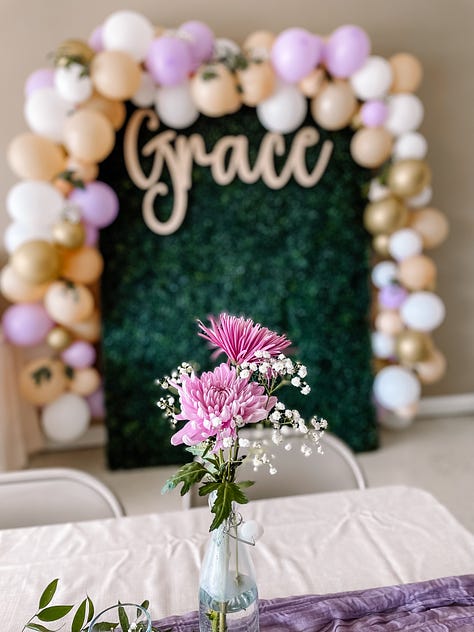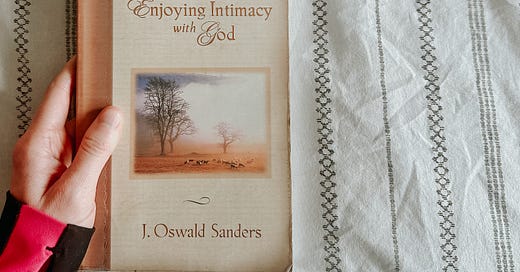
Next Thursday, June 20th is the first official day of summer, a season typically marked by its fullness. The kids are out of school so schedule changes and play activities and vacations are inevitable. The weather warms, inviting us all to venture outside and engage more with the world around us. Lawnmowers hum, ice cream melts on countertops, and sunscreen and sand get stuck between fingers and toes.
Summer comes slowly and then all at once, and while the sunshine and backyard barbeques are old, welcome friends, it can be easy to forget to rest. Suddenly the schedule is booked — perhaps with good, fun things — but the soul gets a bit neglected.
This has been my struggle this summer, and in summer’s past, and perhaps you can relate, friend. So I’ve decided to pull from the Sacred Spaces archives and share in more detail about the practice of Sabbath rest — deep soul rest. I pray that it meets you in the busyness of summer and gives you the tools you need to create more space for your soul to breathe.
Let’s dive in.
We live in a very fast-paced, achievement-oriented, consumerism-minded culture where those working the hardest and striving the longest often get the highest praise.
This kind of fast-paced living tends not to be very life-giving or sustainable long-term, and maybe you’ve experienced the effects of this. Perhaps you’ve faced the consequences of burnout, exhaustion, and weariness bordering on hopelessness. I believe that the faster we go, and the more we strive to produce, the greater danger we are in of misplacing our identity and tangling it up in what we do rather than who we already are.
Or, should I say, Whose we are.
The more time we intentionally take to slow down, pause, breathe deeply, and rest in the presence of God, the deeper our knowledge and belief grow that we are individuals who belong to God — who are Loved by God unconditionally — and that this is our truest identity.
Author, Mark Buchanan, in his book, The Holy Wild: Trusting in the Character of God, says,
“Most of the things we need to be most fully alive never come in busyness. They grow in rest.”
And I believe that intimacy with God also grows in this place of resting with God, which is why we’re going to be unpacking the spiritual practice of Sabbath and what it looks like to cultivate regular rhythms of rest and play.
Looking at Sabbath Through the Lens of God’s Word
Before we unpack how to cultivate Sabbath rhythms in our own lives, let’s take a look at what the Bible has to say on the subject of rest. Let’s begin at the beginning, and take a look at our very first example of rest in Genesis 2:2-3,
“By the seventh day God had finished the work he had been doing; so on the seventh day he rested from all his work. Then God blessed the seventh day and made it holy, because on it he rested from all the work of creating that he had done.” (NIV)
God is all-sufficient and powerful, there is nothing He lacks. So, really, He doesn’t need to rest. But I think at that moment, He wanted to. He wanted to slow down, pause, take a breath, and really savor and delight in the goodness of what He had created.
And because we are called to conform to the image of Christ (Romans 8:29), we are also called to rest from our work. To step back and delight in the goodness that awaits us in resting and playing. God called the seventh day — that Sabbath day of rest — holy and blessed. That means when we intentionally take the time to rest from the work ourselves, we are entering into the holiness and blessedness of Christ.
Sabbath is a gift meant to be received and savored.
Not only do we see the example God gives of His own resting in Genesis, but He also gives it as a command to the Israelites in Exodus 20:9-11,
“Six days you shall labor and do all your work, but the seventh day is a sabbath to the Lord your God. On it you shall not do any work, neither you, nor your son or daughter, nor your male or female servant, nor your animals, nor any foreigner residing in your towns. For in six days the Lord made the heavens and the earth, the sea, and all that is in them, but he rested on the seventh day. Therefore the Lord blessed the Sabbath day and made it holy.” (NIV)
When we choose to enter into Sabbath rest, we are ultimately trusting and obeying in what God has asked of us. Because the truth is, we are finite beings who were not created to live a restless life. God, in His grace and mercy, knows this so He gives us the command to rest not as a punishment, but as a gift and invitation to enter fully into rest to be refreshed and rejuvenated, body, soul, mind, and spirit.
In the New Testament, we still see the importance of keeping the Sabbath in Hebrews 4:9-11,
“There remains, then, a Sabbath-rest for the people of God; for anyone who enters God’s rest also rests from their works, just as God did from his. Let us, therefore, make every effort to enter that rest, so that no one will perish by following their example of disobedience.” (NIV)
I love that first line, “There remains, then, a Sabbath-rest for the people of God;”. This line alone in Hebrews 4 shows us that Sabbath isn’t just a practice that we implement when we begin to feel burnt out. No, it’s so much more than that!
Sabbath is a way of life, a heart posture, and a sacred invitation to trust and be with God. Sabbath rest is the very well that we are invited to draw from which gives us what we need to live a full and abundant life with God and with people.
Defining Sabbath
Now that we’ve taken a look at a few Scripture passages that show us the importance of keeping the Sabbath, let’s further unpack what it is and what it is not.
Practicing Sabbath may seem like a daunting task, especially for those of us who live full and busy lives. But God doesn’t intend for Sabbath to be heavy and anxiety-ridden. It’s not intended to take away from your life, but to add Light, joy, and refreshment to it. In fact, according to Mark Buchanan in his book, The Rest of God: Restoring Your Soul by Restoring Sabbath, Sabbath is an invitation to cease from that which is necessary and receive that which is life-giving.
Sabbath is meant to be a coming Home to your creational identity as God’s Beloved. It’s an invitation to delight in God and that which brings you life. It’s a time of disconnecting from the work, the chores, and the things that have to be done and engaging in the things that bring your soul joy and refreshment. It’s not a time of fasting (although it is in the sense of fasting from the work and that which is necessary), but a time of feasting on the rest of God that we otherwise miss amidst the busyness of everyday life.
Not only is Sabbath a time of deep rest, but a practice of trusting in God. It’s a way of surrendering our own control as we let ourselves be held and tended to, believing that God is God, tending always to all things, as we cease from the work and remember that He is the capable One.
In her book, Soul Feast, Marjorie J. Thompson writes this on the topic of trust and Sabbath,
“Honoring Sabbath time teaches us to release our treasured illusions of being indisensable, allowing us to “let God be God”. Trust is the heartbeat of Sabbath, the bedrock of soul rest.”
As we enter into Sabbath regularly, we enter into a deeper trust in God which leads to deeper intimacy and a mind and soul at rest.
Cultivating Rhythms of Rest & Play
So far, we’ve looked at Sabbath through the lens of God’s Word and further defined what it is and what it isn’t. Let’s take a look now at how to implement the practice of Sabbath by cultivating regular rhythms of rest and play in 4 simple, practical steps.
I want to give a little disclaimer here before moving on to how to implement a Sabbath practice. The bottom line is, there is no wrong way to practice Sabbath! Sabbath is all about exploring ways for you to connect with God and yourself while disconnecting from the work and the striving and entering into His rest. So, if you don’t resonate with these steps, please feel free to experiment with different rhythms that work for you and your season of life! As always, take what you need from this space, and leave the rest to the Holy Spirit.
Step 1: Choose your Sabbath day
It can be helpful to take a look at your calendar and pencil in intentional Sabbath time. I find that when I put things on the calendar, and notify my household of it, I’m more apt to follow through. So, what day of the week works best for you to schedule some rhythms of rest and play? Can you take a whole day, a half day, or an hour or two? There is no time requirement, it’s just important to take time away from your regularly scheduled, busy programming to slow down, pause, and soak in the presence of God.
Step 2: Take a soul inventory
When it comes to implementing rhythms of rest and play, it can be difficult to discern what those rhythms actually are, especially if you aren’t accustomed to slowing down and resting. In this case, it can be super helpful to take a soul inventory. Begin by paying attention to what your soul is needing and craving most right now and then build your rhythms around that.
Are you needing community?
Are you needing solitude and quiet?
Are you needing time out in nature with God?
Are you needing sleep?
Are you needing to laugh or even cry?
Taking a soul inventory of what you’re needing most in this season of your life will be incredibly clarifying when it comes to building new Sabbath rhythms.
Step 3: Choose your rhythms
Rhythms of rest and play can take on so many different forms! For you, perhaps it’s grabbing coffee with a friend and connecting on a relational level, immersing yourself in life-giving community. Or, maybe it’s going for a hike out in nature in solitude, just you and God. Maybe it looks like reading for fun, taking a nap, or picking up a paintbrush and creating something magical on parchment paper. Perhaps it’s taking time for prayer, spiritual reading or Lectio Divina, journaling, or other spiritual practices that draw you closer to the heart of God.
As stated earlier, there is no wrong way to practice Sabbath, and your rhythms of rest and play may change each time you enter into that time with God. The goal is always to connect with the Holy Spirit and yourself on a deeper level as you enter into rhythms that are restful and delightful on a soul level.
When choosing your rhythms of rest and play, ask yourself these questions and spend some time reflecting on your answers:
What gives my soul rest?
What delights me?
What brings me closer to God?
What brings me back to the center of myself?
“When we play, we nudge the border of forever. And this is also what happens when we keep Sabbath. Sabbath, Abraham Joshua Herschel says, is a foretaste and heralding of eternity. Its joy is precisely this: it rehearses heaven.” (Mark Buchanan, The Rest of God)
Maybe resting and playing feel like you’re wasting time, but I assure you that time spent delighting in God is never time wasted. It is sacred and holy and a coming to the edge of eternity. Sabbath is what we all need to live emotionally healthy spiritual lives.
Step 4: Choose your absence
James Clear, the author of the popular book, Atomic Habits, posed a question on his Instagram recently that I think relates beautifully to implementing a regular rhythm of Sabbath. He said,
“Before you ask, “What should I do today?” Ask yourself, “What should I remove today?” Create the space you need to succeed.”
I think deciding what you’re not going to do during your Sabbath time is just as important as deciding what you will do. It may be beneficial to set some boundaries for yourself prior to your Sabbath time by choosing what you will be absent from — or rather — what will be absent from you.
Do you need to silence your phone or even put it aside for a few hours? Does your Apple Watch need to remain on its charger for the day? Will you choose not to worry about that work project and instead be fully present to the time you set aside for rest? Does your household need to know that you’ll be stepping away for a day, or even just a few hours?
Choose your absence wisely, and set some healthy Sabbath boundaries, so that you can be fully present to the things you want to give your attention to during your time of rest and play.
Bonus step: Schedule a time to go on retreat or create your own
A Sabbath practice that I have implemented in my own life over the last two years that has been wonderful is taking time to go on a spiritual retreat. Sometimes, these are silent retreats — meaning that you take a half or full day, or even a weekend or longer — and spend time in silence seeking the Lord in the quiet of His presence. Other times, these retreats may be led or guided by someone facilitating an online or in-person space for you to step away from everyday life and connect with God on a deeper level.
The distractions of everyday life can sometimes get in the way of staying consistent with a Sabbath practice. So it can be helpful to get away for a while, disconnect from the noise, and reconnect with God and yourself.
If you are able, it can be really refreshing to make this a quarterly or annual rhythm. You could do some research and find some Christian contemplative retreat centers near you, sign up for an online retreat, or even create your own retreat day. In the resources section, I will provide some guides you can reference and purchase that teach you how to create your own personal retreat day if this interests you.
Becoming a Reservoir
I hope that this letter to you on keeping the art of Sabbath gives you hope that deep, soul-level rest and refreshment isn’t just possible, but a holy and sacred invitation to find more of God’s presence lingering in your every day right now life — to find more of your truest identity in the Love of God. Sabbath is a deep well that we are invited to continually draw and drink deeply from. It’s intended to be the place of rest that we live from, not just the place we run to in times of burnout and exhaustion.
Sabbath creates space in our lives for more of what brings us life, for more of what gives our soul breath. The truth is, you weren’t created to run on empty, my friend. You were created to be filled to overflowing.
It’s in the disconnecting from the loud, chaos of life that we find the rest of God. It’s in Sabbath rest that we find our truest selves.
The great twelfth-century Cistercian Abbott, Bernard of Clairvaux, once wrote these wise and humble words on what it might look like to become reservoirs of rest — deep wells — rather than shallow canals.
“If you are wise therefore you will show yourself a reservoir and not a canal. For a canal pours out as fast as it takes in, but a reservoir waits till it is full before it overflows, and so communicates its surplus… We have all too few such reservoirs in the Church at present, though we have canals plenty… The canals desire to pour out when they themselves are not yet inpoured; they are readier to speak than to listen, eager to teach that which they do not know, and most anxious to exercise authority on others, although they have not learnt to rule themselves… Let the reservoir of which we spoke just now take pattern from the spring; for the spring does not form a stream or spread into a lake until it is brimful… Be filled thyself, then, but discreetly, mind, pour out thy fullness… Out of thy fullness help me if thou canst; and, if not, spare thyself.”
Bernard’s words ring true in my soul, and I hope they speak to yours just as truly. So, here’s to setting off together down the road to deep soul rest, and here’s to continually allowing the Lord to shape us into reservoirs, drinking continuously and deeply from the well of Sabbath rest.
With you on the journey,
Celia
If you’re a regular reader of Writings of a Beholder, would you consider pledging your support through a monthly or yearly financial gift? If so, there’s an option at the very end of this email to upgrade to a paid subscriber.
*If not, you’ll still receive a weekly letter and retain full access to the archive! Nothing changes. You’ll still get the full experience! Pledges just help to support my work :)
Life Lately






A Breath Prayer for Your Weekend
Inhale: I come to You, Lord.
Exhale: And You will give me rest.
(adapted from Matthew 11:28)
*If you’d like to learn more about the practice of breath prayer, download this complete digital guide to practicing breath prayer.
Resources & Good Things to Pick Up
Here are some of my favorite books related to the topic of Sabbath rest:
The Rest of God: Restoring Your Soul by Restoring Sabbath by Mark Buchanan
Sabbath Keeping: Finding Freedom in Rhythms of Rest by Lynne Baab
Rhythms of Renewal: Trading Stress and Anxiety for a Life of Peace & Purpose by Rebekah Lyons
If you want to create your own half or full-day retreat here are some written guides that you can purchase as well as a podcast episode you can listen to that walks you through how to create your own:
My Etsy shop, The Beholding Co., offers contemplative resources to help you slow down, seek still moments, and behold God’s presence with you in the everyday. Purchase some breath prayer cards, a Lectio Divina bookmark, and more.
Grab a copy of my Bible study, You Are Beloved: a 21-day study on how to root your identity in the love of God, over on Amazon. If you’d like a free 3-day sample of the study, reply to this email and I’ll send it right over!
My friend and licensed spiritual director, Kari Bartkus, offers an 8-week journaling program for those who want to process their grief and trauma with God within the safety of blank journal pages. I’ve completed the program myself and can say confidently that it was incredibly impactful and healing: Journal Gently
My mom is an ovarian cancer survivor who decided to create an encouraging planner for those walking through their cancer journey. It would also be a life-giving tool for caregivers and loved ones walking beside their cancer warrior. The ‘For Such a Time as This’ planner is officially available for purchase now here: Quiet Hope Co.
An Invitation to Pause & Reflect
A regular practice of reflection helps us recognize what’s going on beneath the surface of our souls so we can name it in the Lord’s presence. Because as we learn to name what we feel, what we need, and what we long for, we’re also learning to discern the Spirit’s sweet, gentle voice within our hearts and lives.
Take a few moments today or this weekend to journal or contemplate with the Holy Spirit the following question(s) or prompt(s):
Take a moment and check in with your soul. What is it that you need most this week? Rest? Solitude? Connection? Play?
What Sabbath rhythms might be most life-giving for you in this season?
What could you choose to be absent from this week?
What do you feel invited to be present to this week?












